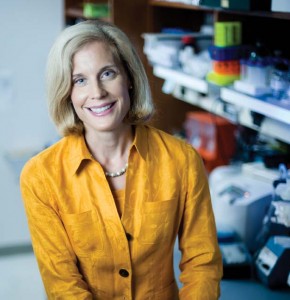Decoding Cancer
March 12, 2013

Jennifer Pietenpol, Ph.D. Photo by Joe Howell
Do you know which physical traits you inherited from your parents and grandparents? I’m fairly tall and so are my parents, so I can surmise that my tall stature was linked to an inherited trait.
Each of us inherits cells with a set of chromosomes containing the genetic information passed down from our parents. Genes within those chromosomes can determine attributes like eye and hair color – brown eyes or red hair are examples of genetically inherited traits.
The risk for developing cancer can also be hard-wired in those inherited genes. Cancer risk can be passed down from one generation to the next, although it’s important to note that having a high risk doesn’t guarantee an individual will develop cancer.
In fact, the vast majority of cancers are linked to DNA mutations that occur inside our cells after birth and during our lifetimes, triggering a cascade of changes at the molecular level. These DNA mutations are called ‘sporadic’ genetic mutations. Vanderbilt researchers are leaders in identifying cancer-causing mutations that are both inherited and sporadic and currently matching the sporadic mutations with new targeted therapies.
In this issue of Momentum, we highlight cancer patient James C. (Jimmy) Bradford Jr. and his role in advancing this important research. Jimmy Bradford – who also served as a valuable member of the Cancer Center’s Board of Overseers – and his family generously collaborated with Vanderbilt researchers to investigate the molecular underpinnings of his form of melanoma. The legacy from this act of wisdom and generosity is a crucial discovery that is already allowing melanoma patients to be more accurately matched with targeted therapies.
In this issue, we also open a window into the role of heritable traits in cancer risk.
Researchers have discovered key genetic markers that can predict – sometimes with remarkable accuracy – the likelihood that someone has inherited a risk of developing a specific form of cancer. Families whose members harbor these hereditary traits must deal with a heightened risk that children in succeeding generations will develop cancer.
While we don’t yet have the tools to prevent these genetic mutations or render them harmless, we do have the ability to identify many of the individuals who are more likely to develop cancer and offer screening tests and preemptive health care services to reduce their cancer risk.
At Vanderbilt, we are determined to help these patients identify and proactively deal with the genetic influences that have shaped their families’ cancer histories. We recruited Georgia Wiesner, M.D., a nationally known and respected cancer genetics expert, to help us launch the new Clinical and Translational Hereditary Cancer Program. Through this initiative, we are providing a crucial service to individuals and families, and our researchers are gaining new insight to the biology of these genetically-induced diseases.
Sincerely,
Jennifer Pietenpol
